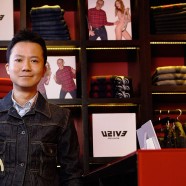
Everyone has a favorite pair of jeans. Whether it’s a worn pair that has seen better days or a designer pair that fits just right, jeans are a personal wardrobe staple. David Pun’s jeans are works of art. He is the enthusiastic chairman and CEO of Evisu, a Japanese lifestyle fashion brand best known for producing jeans with high-quality craftsmanship, vintage buttons and hand-painted details.Six years ago, David was working for a private equity firm and Evisu was one of the portfolio companies. According to David, Evisu was “grossly mismanaged and the brand had lost its identity.” David saw promise in the company and tried to convince his firm’s founders to keep investing, but they wanted to sell.
“Even though the company was on the verge of bankruptcy, I felt confident that my plan could turn the company around. So I organized a management buyout. I mortgaged my mom’s house and used all my savings. I basically put all my eggs in one basket and everyone thought I was crazy, but these opportunities are rare.”
The Evisu brand, named after the Japanese god of prosperity, was founded in 1991 in Japan. At the time, Levi’s was selling their original shuttle loom machines, which they no longer considered efficient. Evisu bought the looms and became part of the vintage heritage denim movement that took off in the ’90s. The brand expanded quickly and globally, but it began to flounder in the 2000s. One of the first decisions David made when he took over was to exit the U.S. and European markets and retrench the business back to Asia.
“We thought there was a huge opportunity in the China markets, where our consumers really embrace the brand. I felt it was the right way to reposition the company for growth. At the time, it was a one-step backward, two-step forward strategy. We wanted to figure out what the brand stands for and what we are trying to communicate to consumers.”
Within one year of David’s leadership, Evisu went from five years of red ink to operating in the black, cutting expenses from $12 million annually to $4 million. Instead of offering 1,000 different products per seasonal collection, David’s team cut down to 400. Today, Evisu has 120 stand-alone stores in Asia. They are mainly concentrated in China, including a five-story concept store in Hong Kong filled with art and a mixology bar.
“Selling the lifestyle of the brand, instead of just focusing on ‘please buy us,’ is important,” says David. “A consumer who wears Evisu appreciates art, challenges the status quo, and wants to self-express in a unique way. Our customers appreciate the more irreverent and humorous elements of the brand.”
There were certainly missteps along the road. David was initially very cost conscious, he explains, and didn’t hire a full team. Now he feels that slowed the turnaround. Because he doesn’t have a fashion background, he believed that hiring international design talent would be more effective; over time he learned that design talent in Asia is strong. And his initial China business partner was not the best choice, but financial pressure led him to rush into certain deals that in hindsight he would have managed differently. Now that the business is stabilized and it’s a “reasonably strong” franchise, David’s next move is figuring out how to reenter the U.S. market.
“What I like most about what I do is being an effective and motivating leader for my team and my peers,” says David. “Fostering the right culture and having people who are passionate and work closely together to achieve the same goal is important. It’s a very different environment from my finance days. In the creative world, the rewards aren’t all financial.”
David is energetic; his life is fast-paced. Four months each year he travels to stores, visiting anonymously to observe consumers in action. In his downtime, he enjoys racing cars at the racetrack and playing squash. As a student and squash player at Milton, David was hugely influenced by former coach and beloved faculty member Frank Millet.
“When I was a student, he was a grandfather figure to me on and off the squash courts,” says David, who affectionately calls him FDM. “I apply what I learned from him subconsciously in my work — lead by example, roll up your sleeves and get to work. I once saw FDM fixing a clogged toilet at the squash courts! Another time after a match, he was the last person there, picking up the trash all the students had left behind — their wrappers, their drinks. He could easily have had someone else do it, but he was doing it himself, and that moment stayed with me. I learned there are no shortcuts. Everyone has to do their time; put in the hard work and the hard work will pay off.”
David embraces the challenges of running a company in the hypercompetitive retail market. He balances ambition with pragmatic business sense, striving to keep a creative element in his commercial enterprise.
“When you take a risk like this, a lot of naysayers challenge your thought process or your strategy. When we exited the U.S. market, industry people said it was going to be the end of Evisu: ‘You don’t know what you are doing, you are a finance guy!’ But that’s the beauty of not having a fashion industry background, because I think differently. I ask a lot of questions, talk to many different people, and do my research. But at the end of the day I stick with my gut instinct. Obviously, you have to be realistic and listen to what people say, but at the same time, you have to dare to challenge the norm, be confident in yourself and use your best judgment.”
by Liz Matson



